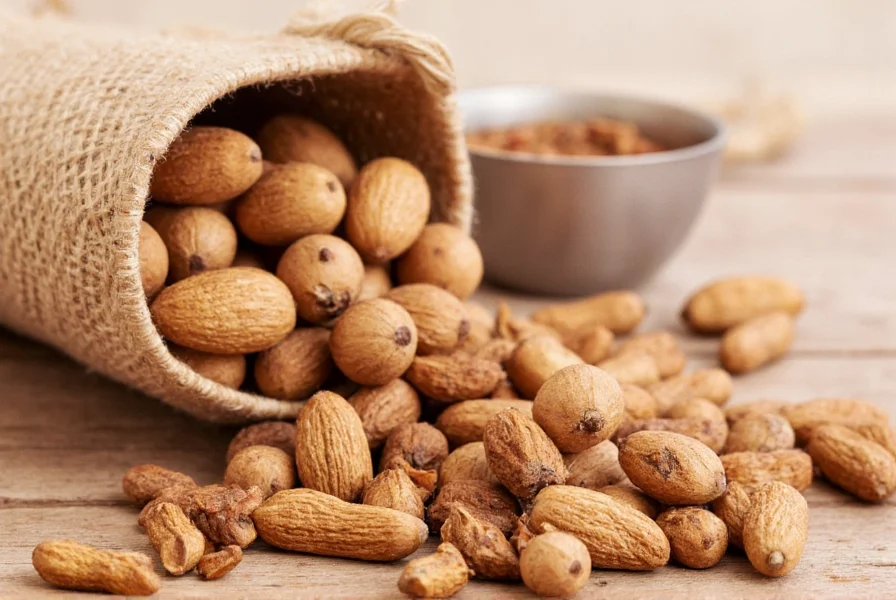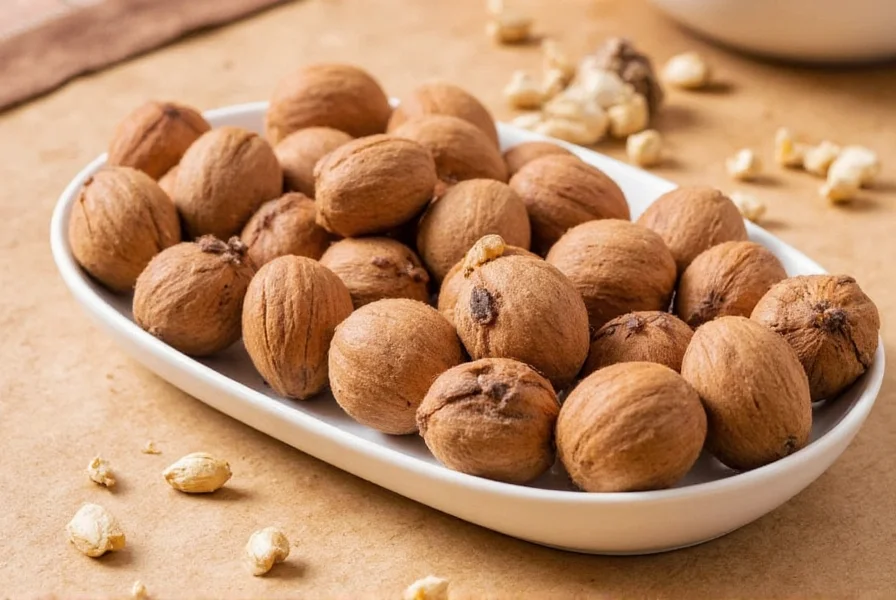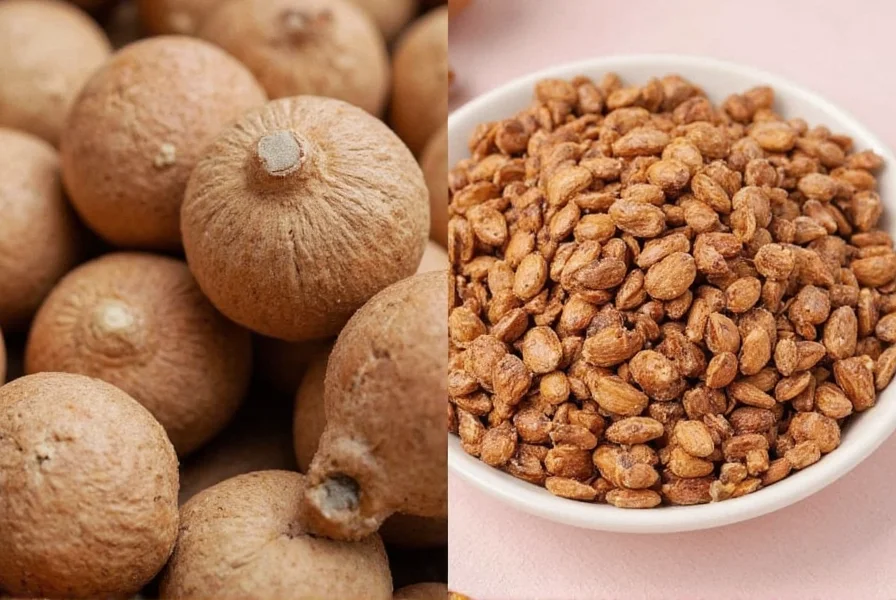Nutmeg, the seed of the Myristica fragrans tree, has been valued in traditional medicine for centuries and is now gaining scientific validation for its impressive health properties. This aromatic spice contains powerful compounds like myristicin, elemicin, and safrole that contribute to its therapeutic potential. While commonly used in small amounts for culinary purposes, understanding the proper application of nutmeg can unlock significant health advantages when consumed responsibly.
Nutritional Profile of Nutmeg
Beyond its distinctive flavor, nutmeg packs a nutritional punch in minimal quantities. Just one teaspoon (2 grams) provides:
| Nutrient | Amount per Teaspoon | % Daily Value |
|---|---|---|
| Calories | 12 | 1% |
| Fiber | 1g | 4% |
| Magnesium | 20mg | 5% |
| Copper | 0.1mg | 11% |
| Manganese | 0.1mg | 4% |
This nutritional foundation supports many of nutmeg's health-promoting properties, particularly when combined with its unique phytochemical composition.
Anti-Inflammatory Properties of Nutmeg
Nutmeg contains significant levels of phenylpropanoids and lignans that demonstrate potent anti-inflammatory effects. Research published in the Journal of Agricultural and Food Chemistry found that nutmeg extract significantly reduced inflammatory markers in laboratory studies. The compound myristicin appears particularly effective at inhibiting inflammatory pathways.
For individuals seeking natural approaches to nutmeg for inflammation reduction, incorporating small amounts into daily routines may provide complementary support. Try adding a pinch to warm milk or smoothies, but remember that excessive consumption can produce adverse effects rather than health benefits of nutmeg spice.

Digestive Health Benefits
Traditional medicine systems have long used nutmeg to address digestive concerns, and modern research supports these applications. Nutmeg stimulates digestive enzyme production while reducing intestinal spasms. A 2020 study in Phytotherapy Research demonstrated that nutmeg extract improved gut motility and reduced symptoms of indigestion in clinical trials.
When exploring how nutmeg improves digestion, consider these practical applications:
- Add a pinch to post-meal herbal teas
- Combine with ginger in cooking for enhanced digestive support
- Use in small amounts in spice blends for meat dishes to aid protein digestion
These applications leverage nutmeg's carminative properties without risking the potential side effects associated with excessive consumption.
Natural Sleep Aid and Anxiety Reduction
One of the most well-documented nutmeg spice sleep benefits relates to its mild sedative properties. The compound myristicin interacts with neurotransmitters in ways that promote relaxation. A study in the Journal of Ethnopharmacology found that nutmeg extract demonstrated significant anxiolytic effects in animal models, suggesting potential applications for human anxiety management.
For those struggling with occasional sleep difficulties, a traditional remedy involves adding 1/4 teaspoon of freshly grated nutmeg to warm milk before bedtime. This practice combines nutmeg's natural compounds with the sleep-promoting properties of warm milk and tryptophan. However, it's crucial to use only small amounts, as higher doses can produce the opposite effect and cause restlessness.
Oral Health Applications
Nutmeg's antimicrobial properties make it valuable for nutmeg for oral health benefits. The essential oils in nutmeg, particularly myristicin and elemicin, demonstrate effectiveness against oral pathogens that cause cavities and gum disease. Research in the Journal of Contemporary Dental Practice found nutmeg extract inhibited the growth of Streptococcus mutans, a primary bacteria responsible for tooth decay.
Traditional dental practices in some cultures include chewing small pieces of nutmeg for fresh breath and gum health. Modern applications might involve:
- Adding nutmeg to homemade toothpaste formulations
- Using nutmeg-infused mouth rinses
- Combining with clove and cinnamon in natural dental care products
Pain Relief Properties
The anti-inflammatory compounds in nutmeg contribute to its nutmeg for pain relief applications. Traditional medicine systems have used nutmeg topically for joint pain and muscle aches. Scientific research supports these uses, with studies showing nutmeg extract reduced pain responses in laboratory models.
For those exploring natural pain management options, consider these approaches:
- Creating a warm compress with nutmeg-infused oil for sore muscles
- Adding nutmeg to baths for full-body relaxation
- Combining with turmeric in cooking for enhanced anti-inflammatory effects
These methods leverage nutmeg's natural analgesic properties while avoiding the risks associated with excessive internal consumption.
Antioxidant Powerhouse
Nutmeg ranks surprisingly high on the ORAC (Oxygen Radical Absorbance Capacity) scale, indicating strong nutmeg antioxidant properties. These antioxidants help neutralize free radicals that contribute to cellular damage and chronic disease development. A study in Food Chemistry found that nutmeg's antioxidant capacity exceeds that of many common spices.
The lignans in nutmeg, particularly macelignan, demonstrate particularly potent antioxidant activity. These compounds help protect cells from oxidative stress, potentially reducing the risk of chronic conditions associated with aging. Incorporating nutmeg into your spice rotation provides a valuable source of these protective compounds.
Safety Considerations and Proper Usage
While exploring the health benefits of nutmeg spice, understanding safe consumption is paramount. Nutmeg contains myristicin, which in high doses (typically more than 2-3 teaspoons) can cause unpleasant and potentially dangerous side effects including:
- Nausea and vomiting
- Dizziness and confusion
- Increased heart rate
- Visual disturbances
- Delirium in extreme cases
The safe daily intake of nutmeg remains below 1-2 teaspoons (2-4 grams) for most adults. Pregnant women should avoid medicinal amounts of nutmeg, though culinary use is generally considered safe. Individuals taking certain medications, particularly antidepressants or sedatives, should consult healthcare providers before using nutmeg medicinally due to potential interactions.

Practical Incorporation into Daily Routine
To safely enjoy the nutritional value of nutmeg spice, consider these practical applications:
- Add to morning oatmeal or porridge (⅛-¼ teaspoon)
- Blend into warm beverages like golden milk or chai
- Use in small amounts in vegetable dishes, particularly squash and sweet potatoes
- Combine with cinnamon and cloves in baking recipes
- Create a soothing bedtime drink with warm milk and a pinch of nutmeg
Freshly grated nutmeg from whole seeds provides significantly more potent flavor and potentially greater health benefits compared to pre-ground versions, as the essential oils remain better preserved.
Conclusion
Nutmeg offers a remarkable array of science-supported health benefits when used appropriately. From its anti-inflammatory and digestive properties to its sleep-enhancing and antioxidant capabilities, this humble spice deserves recognition as both a culinary treasure and a potential wellness ally. The key to safely enjoying these benefits lies in moderation and understanding proper usage. By incorporating small, measured amounts of high-quality nutmeg into your daily routine, you can harness these advantages while avoiding potential risks associated with excessive consumption.
Frequently Asked Questions
What is the recommended daily amount of nutmeg for health benefits?
For health benefits without risk of side effects, limit nutmeg consumption to 1/8 to 1/4 teaspoon (approximately 0.5-1 gram) daily. This amount provides therapeutic benefits while staying well below the threshold where myristicin compounds may cause adverse effects. Culinary use typically involves even smaller amounts (1/16 teaspoon or less per serving).
Can nutmeg really help with sleep problems?
Yes, nutmeg contains myristicin which has mild sedative properties that may help with occasional sleep difficulties. Research suggests it interacts with neurotransmitters to promote relaxation. For sleep support, add 1/4 teaspoon of freshly grated nutmeg to warm milk before bedtime. However, it's not a substitute for medical treatment of chronic insomnia, and higher doses can actually cause restlessness rather than sleep.
What are the potential side effects of consuming too much nutmeg?
Consuming more than 2-3 teaspoons of nutmeg can cause unpleasant side effects including nausea, dizziness, increased heart rate, dry mouth, and visual disturbances. In extreme cases (typically 5+ teaspoons), it may cause delirium, hallucinations, and severe discomfort that can last up to 48 hours. These effects stem from myristicin toxicity. Always use nutmeg in culinary amounts (1/8-1/4 teaspoon maximum for medicinal purposes) and consult a healthcare provider before using it therapeutically.
Is fresh nutmeg better than pre-ground for health benefits?
Yes, freshly grated nutmeg from whole seeds provides significantly greater health benefits than pre-ground versions. The essential oils and active compounds like myristicin degrade quickly when exposed to air, light, and heat. Whole nutmeg seeds retain their potency for months when stored properly, while pre-ground nutmeg loses much of its therapeutic value within weeks. For maximum nutmeg antioxidant properties and other benefits, always choose whole seeds and grate them immediately before use.
Can nutmeg interact with medications?
Yes, nutmeg may interact with certain medications, particularly antidepressants (especially MAOIs), sedatives, and medications metabolized by the liver. The myristicin in nutmeg can enhance the effects of sedatives and potentially cause adverse reactions when combined with certain antidepressants. If you're taking prescription medications, consult your healthcare provider before using nutmeg in medicinal amounts (beyond normal culinary use). Those on blood thinners should also exercise caution due to nutmeg's potential effects on blood clotting.











 浙公网安备
33010002000092号
浙公网安备
33010002000092号 浙B2-20120091-4
浙B2-20120091-4